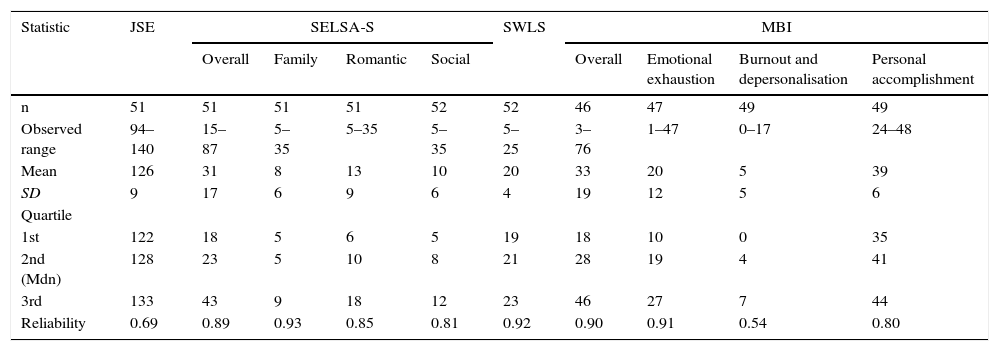Empathy has been described as an essential competence of healthcare professionals who are working in palliative care and homecare services. In these services, usually accompanied by a high risk of physical and emotional burnout, empathy can play an important role in the improvement of occupational wellbeing. The aim of this study was to confirm the role of empathy in the prevention of loneliness and burn out, and in the promotion of life satisfaction.
MethodsIn 2016, an observational study was carried out in Chile with professional nurses who were working in palliative care and homecare services. Empathy with the patients, loneliness, life satisfaction, and burnout were measured using psychometric scales. Correlation analyses were applied to confirm relationships among the elements measured.
ResultsIn a sample of 64 participants, positive correlations were confirmed between empathy and life satisfaction (P=0.40; p=0.003), and between empathy and professional experience (P=0.29; p=0.04). On the other hand, inverse correlations were confirmed between empathy and burnout (P=–0.38; p=0. 01), and between empathy and loneliness (P=–0.41; p=0.004).
ConclusionsThese findings confirm the important role that empathy plays in the prevention of loneliness and burnout, and in the promotion of life satisfaction. Evidence found suggests that empathetic abilities can be improved by the professional experience.
La empatía ha sido descrita como una competencia esencial de los profesionales sanitarios que trabajan en servicios de cuidados paliativos y atención domiciliaria. En estos servicios, normalmente acompañados por un alto riesgo de desgaste físico y emocional, la empatía puede jugar un importante papel en la mejora del bienestar ocupacional. El objetivo de este estudio fue confirmar el papel de la empatía en la prevención de la soledad y el desgaste, y en la promoción de la satisfacción vital.
MétodosEn 2016, un estudio observacional fue realizado en Chile con profesionales de enfermería que estaban trabajando en cuidados paliativos y en servicios de atención domiciliaria. La empatía con los pacientes, la soledad, la satisfacción vital y el desgaste fueron medidos utilizando escalas psicométricas. Se aplicaron análisis de correlación para confirmar las relaciones entre los elementos medidos.
ResultadosEn una muestra de 64 participantes, se confirmaron correlaciones positivas entre la empatía y la satisfacción vital (P=0,40; p=0,003), y entre la empatía y la experiencia profesional (P=0,29; p=0,04). Por otra parte, se confirmaron correlaciones inversas entre la empatía y el desgaste (P=–0,38; p=0,01), y entre la empatía y la soledad (P=–0,41; p=0,004).
ConclusionesEstos hallazgos confirman el importante papel que la empatía juega en la prevención de la soledad y el desgaste, y en la promoción de la satisfacción vital. La evidencia encontrada sugiere que las habilidades empáticas se pueden mejorar por la experiencia profesional.








